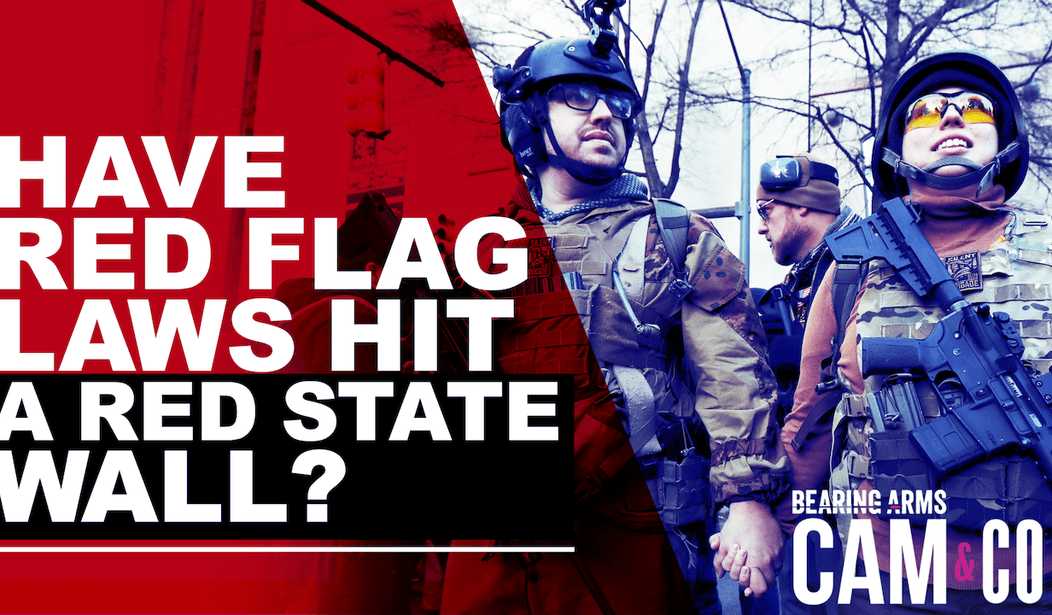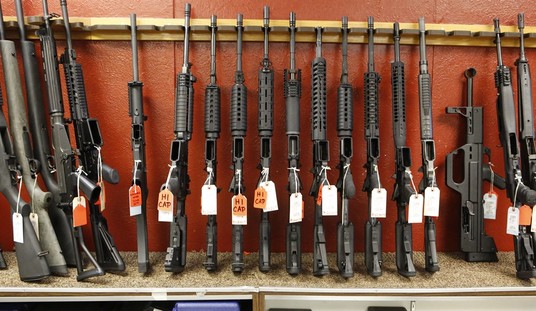The bad news on today’s Bearing Arms’ Cam & Co is that 19 states have now adopted “red flag” gun seizure laws in the past few years. The good news is that the gun control lobby has run out of easy legislative targets, and may have run into a brick wall of red states that aren’t nearly as amenable to the idea of imposing Extreme Risk Protection Orders on gun owners as states controlled by Democrats.
In fact, as the Pew Charitable Trusts point out in a long piece bemoaning the lack of progress in putting these new gun control laws on the books, Florida is really the only Republican-controlled state to enact red flag laws. The GOP-led legislature adopted the law shortly after the murders at Marjory Stoneman Douglas High School in 2018, but no red states have followed suit. In fact, Oklahoma has gone so far as to approve an anti-red flag law barring the state or any of its political subdivisions from enacting Extreme Risk Protection Orders, and I wouldn’t be surprised to see other red states follow suit if a national red flag bill starts to get any traction in Congress.
That isn’t likely to happen any time soon, however, which means most of the gun control lobby’s efforts on imposing red flag restrictions are taking place at the state level. In both Wisconsin and Pennsylvania their Democratic allies have introduced red flag bills, and while the Democratic governors have offered support, the Republican-controlled legislatures have balked at the bad bills. That, in turn, has led to some pretty ridiculous arguments on the part of anti-gunners.
This measure also should appeal to gun owners, said Adam Garber, executive director of CeaseFirePA, a Pennsylvania gun safety group. Under current state law, police officers and doctors can commit a person to a psychiatric facility, even against their will, if they are at risk to themselves or others. That person also loses access to their firearms, possibly for life. Red flag laws are a temporary alternative that preserves the gun owner’s long-term rights.
“This policy is not about interfering with the right to own guns,” he said. “It’s about saving gun owners’ lives. This will give them a chance to go hunting another day.”
Despite Garber’s claims, red flag laws aren’t about saving lives. They’re simply about taking guns away, and using an incredibly low legal standard and dubious due process protections to do so.
As Garber notes, there are civil commitment laws on the books in all 50 states, and being adjudicated mentally defective can indeed lead to a lifetime loss of your right to keep and bear arms. But at least that system has some safeguards, like the fact that a mental health professional is the one making a determination of dangerousness, as opposed to a judge hearing only one side’s evidence.
Remember, we’re talking about people who are supposedly a danger to themselves or others. Why then would we think that merely taking any legally owned guns away removes the danger? Even in “successful” red flag petitions, once the guns have been removed, the person who is supposedly dangerous still has access to knives, car keys, rope, pills, bows and arrows, and all kinds of other objects they could use to harm themselves or other people.
There’s no mental health component at all in most red flag laws, so it’s ridiculous to claim that they’re more about mental health than gun control. And Garber doesn’t mention the fact that these red flag petitions can be extended an indefinite number of times, which means that a “temporary” gun ban can end up being a permanent loss of Second Amendment rights without ever being convicted (or even accused) of a crime or adjudicated as mentally defective.
Another danger that Garber glosses over is the fact that, while defendants in criminal cases have the right to a public defender if they can’t afford an attorney, those subject to red flag petitions do not. Red flag cases are handled in civil, not criminal court, and even though it’ll be a lawyer from the local prosecutor’s office handling the petition for the state, unless the subject of a petition can afford to hire their own attorney they’re going to have to defend themselves in court without any legal representation of their own once they finally do get their day in court.
Before that happens, however, the prosecutor will go before a judge and present their case as to why the petition should be granted. At that point, the subject of the petition is generally not even aware that an ERPO has been filed, and may not learn about it until police arrive at their doorstep to confiscate their firearms. Unlike a criminal trial, where a prosecutor has to prove someone’s guilt beyond a reasonable doubt, the burden of proof to show “dangerousness” is much lower, and to make matters worse, in the vast majority of cases the petition subject can’t offer any evidence to refute the prosecutor until after a preliminary determination has been made.
Beyond the constitutional and due process concerns, one of the reasons I’m opposed to red flag laws is that they allow lawmakers to say they’re “doing something” instead of actually addressing the difficult issue of mental health access and funding. If we’re honestly concerned about people who are dangers to themselves and others, we can’t simply pretend that we can solve the problem by taking their legally-owned guns away. Not only are there plenty of dangerous people who don’t own firearms, but as we all know, there are some judges and prosecutors out there who’ll rubber stamp red flag petitions under the theory that it’s better to be safe than sorry. Red flag laws have enormous potential to be abused, while they offer no real solutions for helping those who are truly in the midst of a mental health crisis and pose a danger to themselves and the community. I’m glad they seem to have hit a red state brick wall, and I hope that in the years ahead we can even repeal some of these awful laws in the 19 states that have put them in place.









Join the conversation as a VIP Member